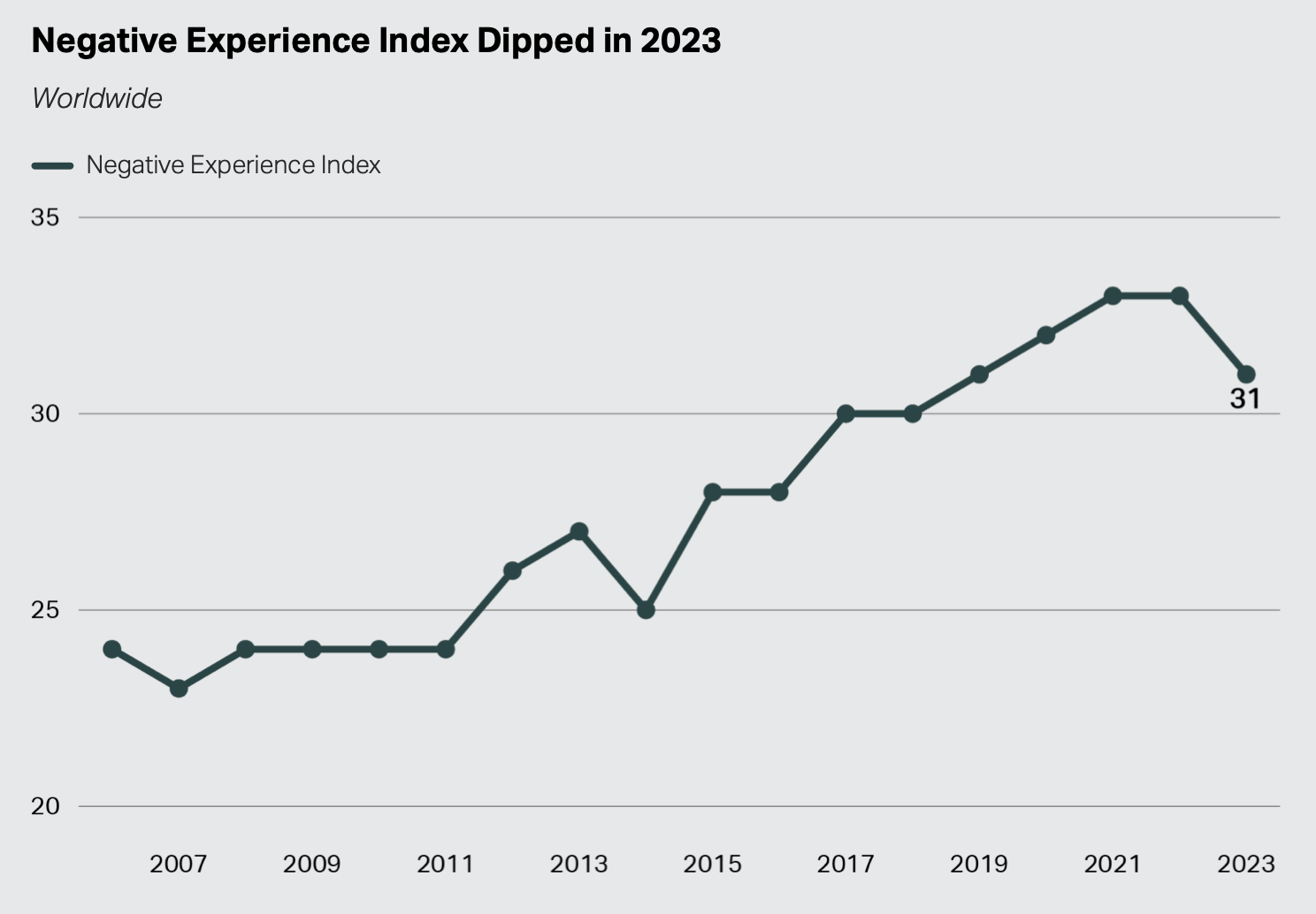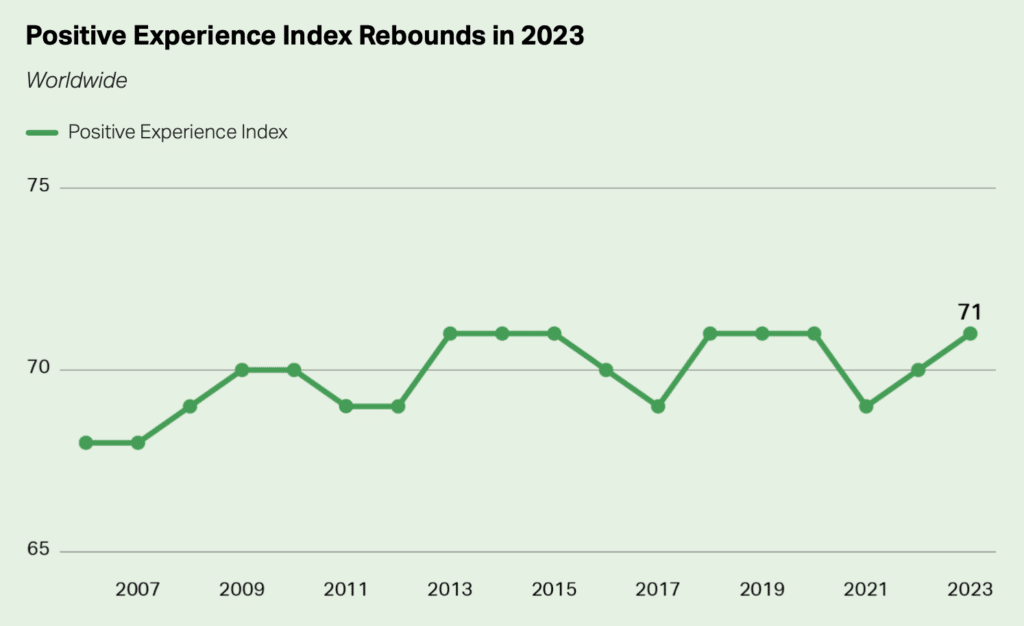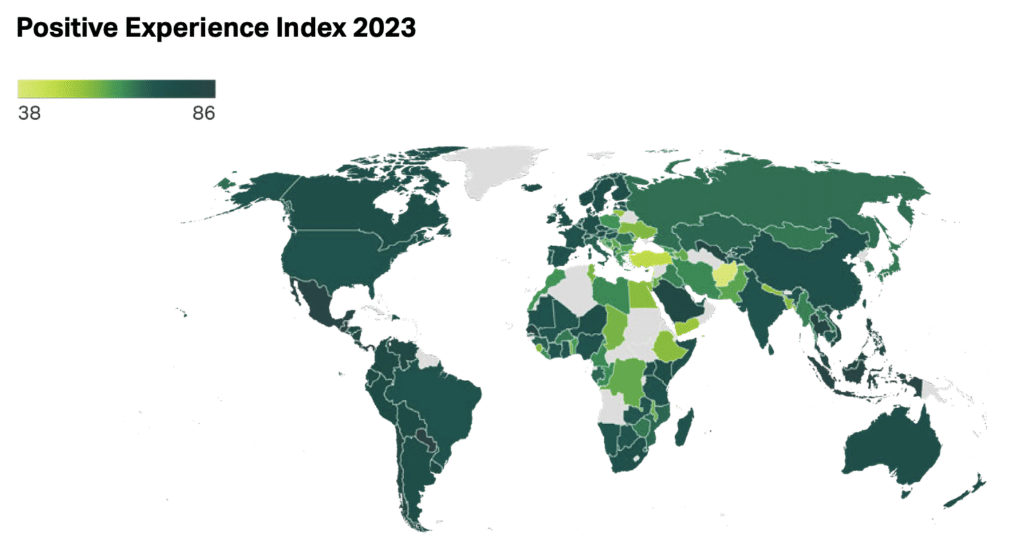Volcanoes are erupting in The Philippines, but on-fire Australia received some welcome rain. The Iran war cries have been called off and The Donald’s military powers are about to be hamstrung by the Senate. Meanwhile, his impeachment trial is starting, and we’re all on Twitter for a front-row seat.
What Could Go Right? Feeling Good Again
The world has returned to pre-pandemic levels of positivity.
This is our weekly newsletter, What Could Go Right? Sign up here to receive it in your inbox every Thursday at 5am ET. You can read past issues here.
Feeling Good Again
This week, the analytics firm Gallup released their latest annual report on global emotions, which measures the prevalence of positive and negative daily experiences. It’s a massive undertaking, with 146,000 people surveyed across 142 countries in 2023.
The main takeaway of this year’s report is that the world has rebounded emotionally from the pandemic, with positive emotions—feeling well-rested and respected, laughing and enjoying, and learning something new or interesting—returning to pre-pandemic highs and negative emotions like stress, anger, worry, and sadness declining. Humanity, by and large, is resilient! We knew that already, but a reminder is always welcome.
Gallup also highlighted, perhaps surprisingly, that people under 30 are the most positive of all age groups, and were ahead of the pandemic recovery curve: they returned to their pre-pandemic positivity levels a year before everyone else.
If you’d like to up your own positive experiences, consider a move to Latin America or Southeast Asia, the regions where people have the highest positivity scores, both in 2023 and in the past. Paraguay and Panama tied for first, with a score of 86/100; Gallup notes that high scores “strongly relate to people’s perceptions of their living standards, personal freedoms, and the presence of social networks.” (Italics are mine.) For context, the least positive country is Afghanistan, with a score of 38.
Countries going through, as Gallup notes, “economic and political turmoil or military conflict” usually make up the list of places with the most daily negative emotions. Guinea’s negative experience score, at 53, was highest in the world, followed by Chad and Sierra Leone. Israel broke onto the top-ten most negative list for the first time this year, with Gallup conducting their survey in Israel two weeks after the October 7 attacks.
The country with the lowest negativity score was Vietnam, with an 11, but some of the other countries with the lowest levels of stress, anger, worry, and sadness were not necessarily the ones you would assume: Kazakhstan, for instance, followed Vietnam with a score of 14, and Russia was ninth lowest in the world, with a 20.
There have been year-on-year changes in individual countries and for individual emotions, of course. What is remarkable to me, however, is just how stable the world’s emotional experience is as a whole. People have reported increasing negative emotions over the past decade . . .

. . . whereas positive emotions have been flatter.

But both operate in a pretty narrow band, a maximum of about ten points for negative emotions and four for positive. Note that both graphs’ y axes are not set at zero, which makes shifts look more pronounced.
And while there are pockets of the globe where deep negativity is the norm, the world is experiencing a lot more positivity on the day-to-day than we might guess, especially if we’re taking our cues from the news.

I may have come to a more worried conclusion if the negative experience index hadn’t dipped, however. A persistent rise despite the end of the pandemic would have been a big red flag that a worldwide trend of more negativity may be entrenched. A relatively narrow band of change notwithstanding, the increase in negative emotions between 2011 and 2019 demands an explanation, and we’ll have to see if it continues as time goes on.
Gallup is hot on the trail of one possible culprit: loneliness, which they just began measuring in 2023 and which they note substantially affects the likelihood of whether other negative emotions are reported. A person who says they are lonely is more likely to say that they are sad, stressed, angry, and worried than someone who does not feel lonely.
I think it’s a solid theory, but I’m curious to hear from our readers as well. Do you have any theories of your own that explain the past decade of higher-but-not-skyrocketing negativity? Email hello@theprogressnetwork.org to share them with me.
Correction: Last week’s newsletter referenced the “late” historian Henry Louis Gates, Jr. Gates is still alive. Thank you to the many readers who wrote in about this error.
Another reader also commented on the absence of activist Opal Lee in the article. The “Grandmother of Juneteenth,” Lee campaigned for the day to become a national holiday using a variety of means, most famously embarking on a journey from her home in Fort Worth, Texas to Washington, DC on foot.
What Could Go Right? S6 E11

What does the surprising outcome of the Indian elections mean for the state of democracy there? Zachary and Emma delve into the failure of polling predictions and discuss the implications of the election results with Ravi Agrawal, the editor-in-chief of Foreign Policy. The conversation looks towards India’s future growth and the challenges it faces. While India has the potential to attract companies and become a destination for business, average incomes remain low, and further reforms are needed. | Listen now
By the Numbers
72%: The decline in under-five mortality in Southern Asia between 1990 and 2022, according to a new report from UNICEF, WHO, and the UN. About 3.7 million fewer children die annually in the region now than in 1990.
175K: The number of low-level marijuana convictions pardoned by Maryland governor Wes Moore last week, which corresponds to about 100,000 people.
Quick Hits
🏳️🌈 Once the legislation is signed into law, Thailand will become the first country in Southeast Asia and the third in Asia to legalize same-sex marriage after the bill garnered a 130-to-4 vote in the Senate.
🌘 A Chinese-led mission to the far side of the Moon has successfully returned with the first-ever samples from there. China is the only country to have ever landed on the far side of the Moon.
🧬 A CRISPR gene-editing therapy for cystic fibrosis has been successful in mice after overcoming one crucial obstacle: reaching lung cells covered with mucus. The lung cell modifications lasted for the mice’s entire lifespans, a promising sign for humans.
⚖️ In a move that may reduce the country’s prison population, Brazil’s Supreme Court has voted to decriminalize possession of marijuana for personal use. Since 2006, people with small amounts of the drug have been arrested on drug trafficking charges.
🐱 In conservation news, over 12 rare species have been saved in the Caribbean in the past 30 years. And, the Iberian lynx has been downgraded from “endangered” to “vulnerable” after populations in Portugal and Spain topped 2,000. The lead conservationist for the cat called it the “greatest recovery of a cat species ever achieved through conservation.”
🌍 Sierra Leone’s Parliament has passed a bill banning child marriage. “The West African country is home to 800,000 child brides, half of whom were married before the age of 15,” reports Semafor, citing numbers from UNICEF.
🏥 A new antiviral, injected twice yearly, prevented all cases of HIV in a Phase 3 trial of over 2,000 women—a better result than already existing antivirals that were tested simultaneously. An effective injection that only needs to be done twice annually may lead to greater uptake and follow-through for treatment than with the daily pills that are the current standard.
💸 A 31-year-old German-Austrian heiress is giving away 25 million euros, almost all of her wealth, after assembling a 50-person group of “diverse citizens” to decide which organizations it should go to. Afterward, she will become one of us and transition into working life.
🌴 A study found that a monkey population off the coast of Puerto Rico that is known for being especially quarrelsome became more cooperative after Hurricane Maria felled the island’s share of shade-providing trees. It is one of the first studies to show that animals can respond to environmental pressures with changes to their social behavior. (NYT $)
💡 Editor’s pick: Sarah Isgur, senior editor at The Dispatch, has a convincing case for why activists should push for the more difficult but longer-lasting path of passing legislation through Congress, rather than being satisfied by executive actions that get quickly reversed. (NYT $)
TPN Member Originals
(Who are our Members? Get to know them.)
- The robots won’t cause massive unemployment this time, either | The Geek Way | Andrew McAfee
- How to avoid an uncivil war | Forbes | Penny Abeywardena
 What the EU’s conservative shift means for the climate | Columbia Energy Exchange | Jason Bordoff
What the EU’s conservative shift means for the climate | Columbia Energy Exchange | Jason Bordoff- An Emersonian guide to taking control of your life | The Atlantic ($) | Arthur Brooks



Forth Worth?
*Fort! Sorry, that was a typo. Thanks for the heads up. It has been fixed.